
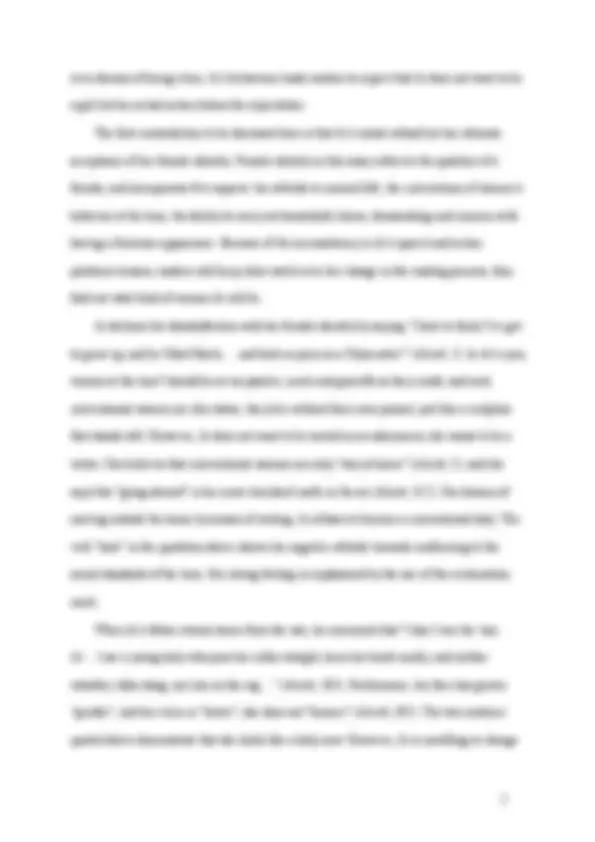
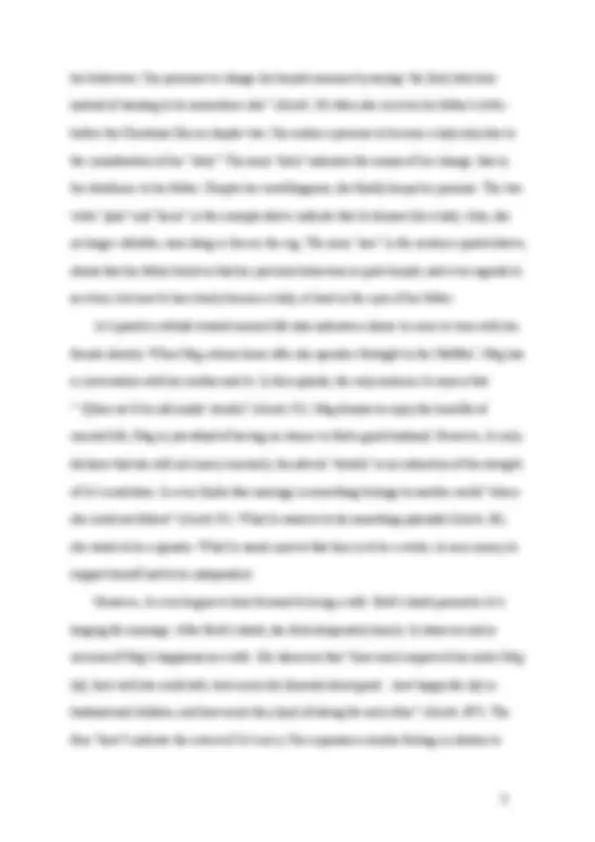
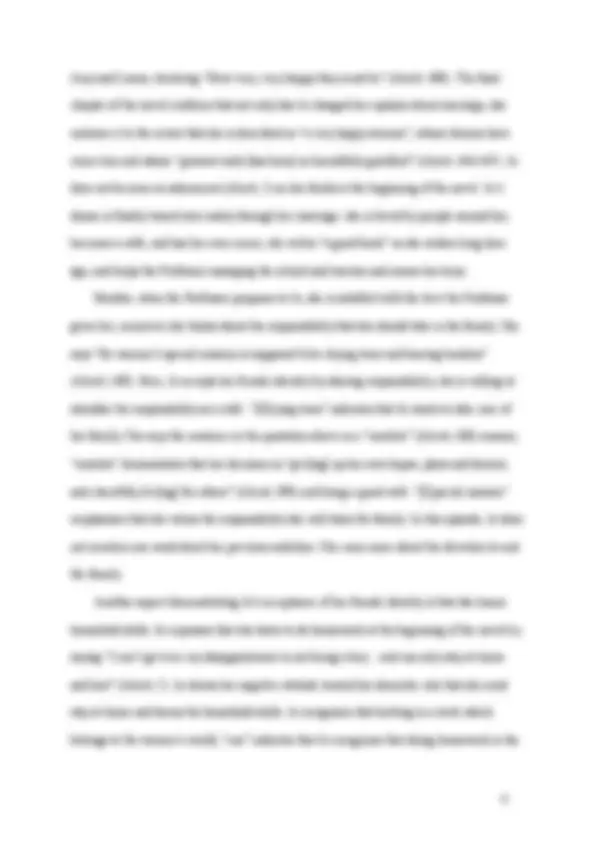
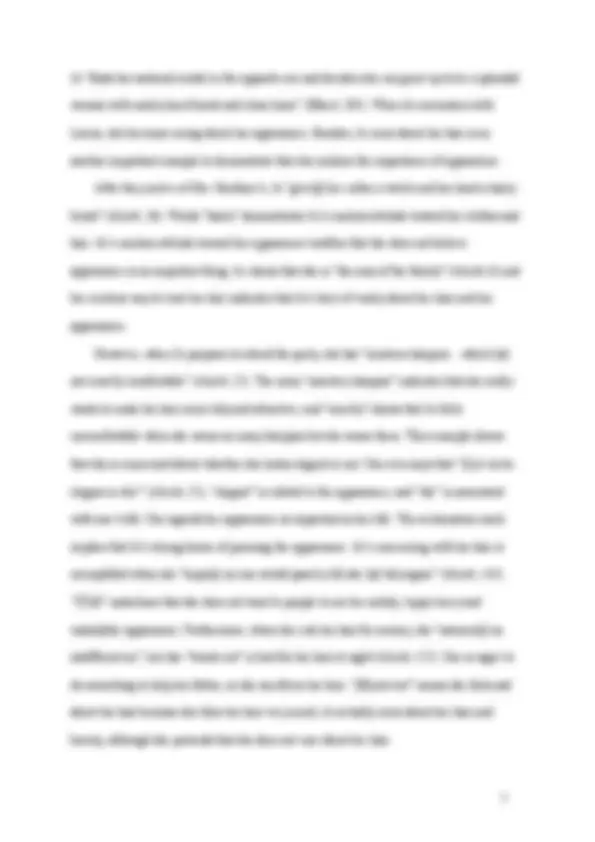
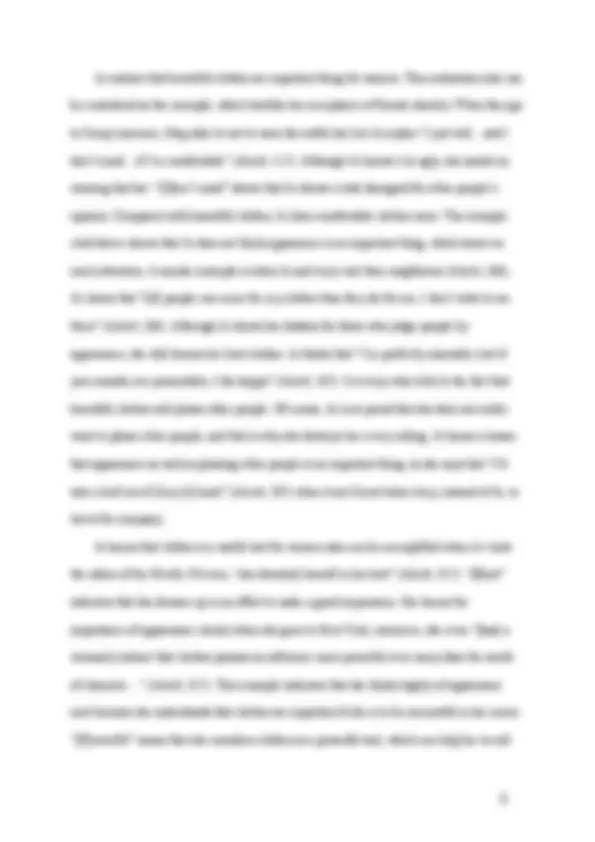
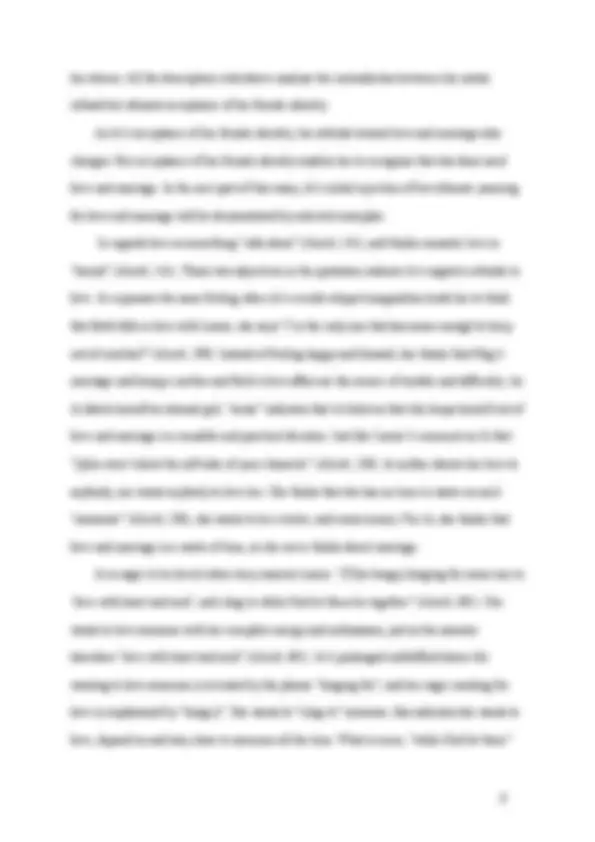
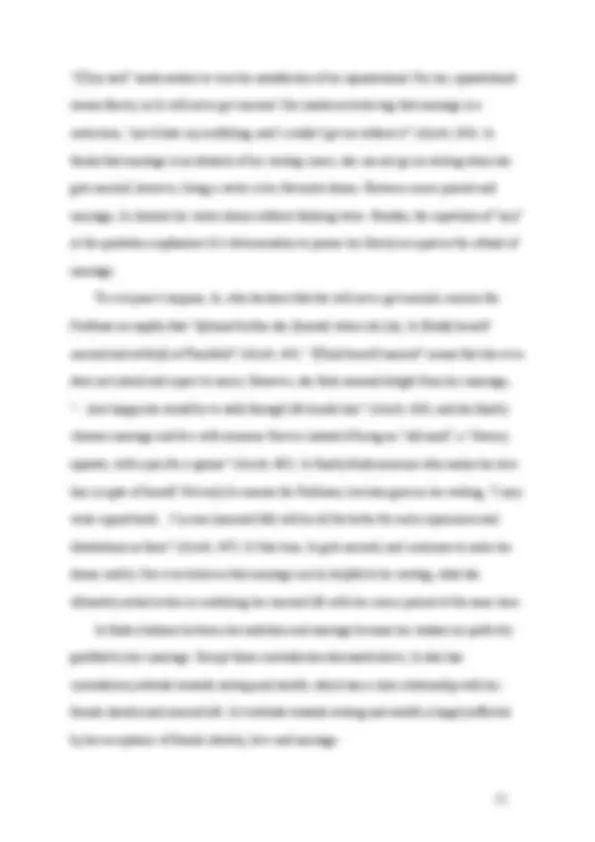
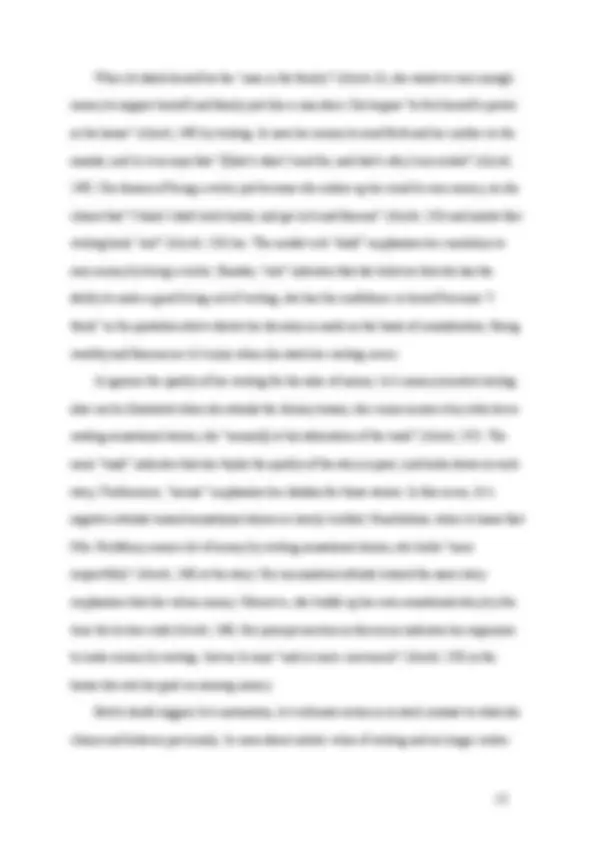
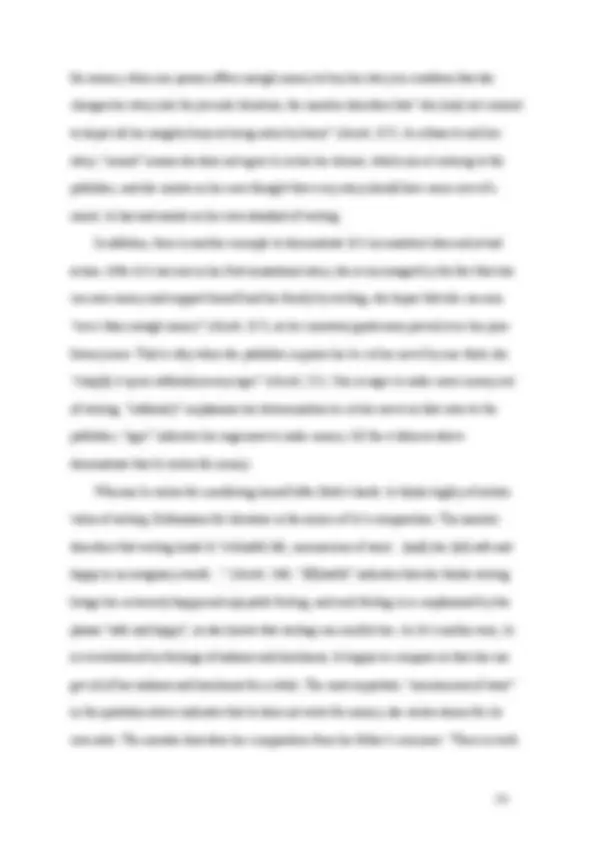
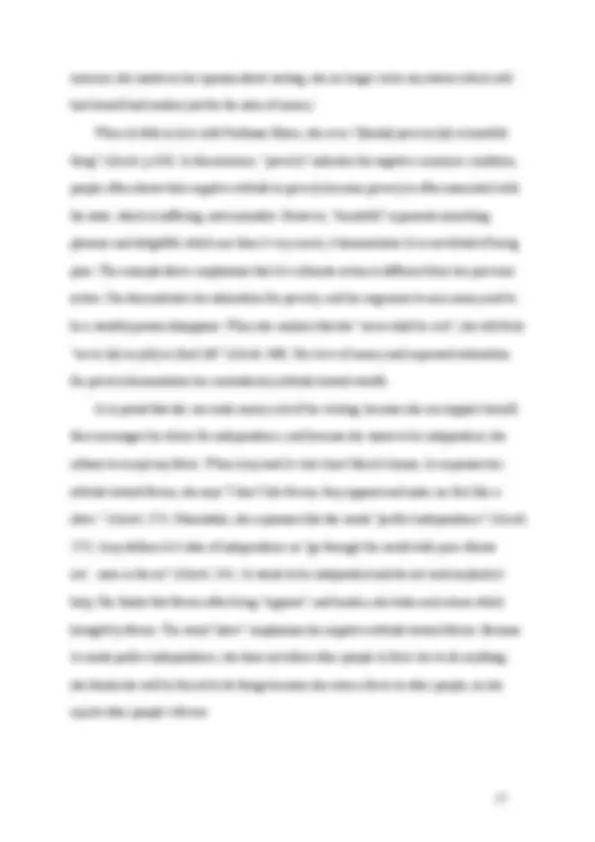
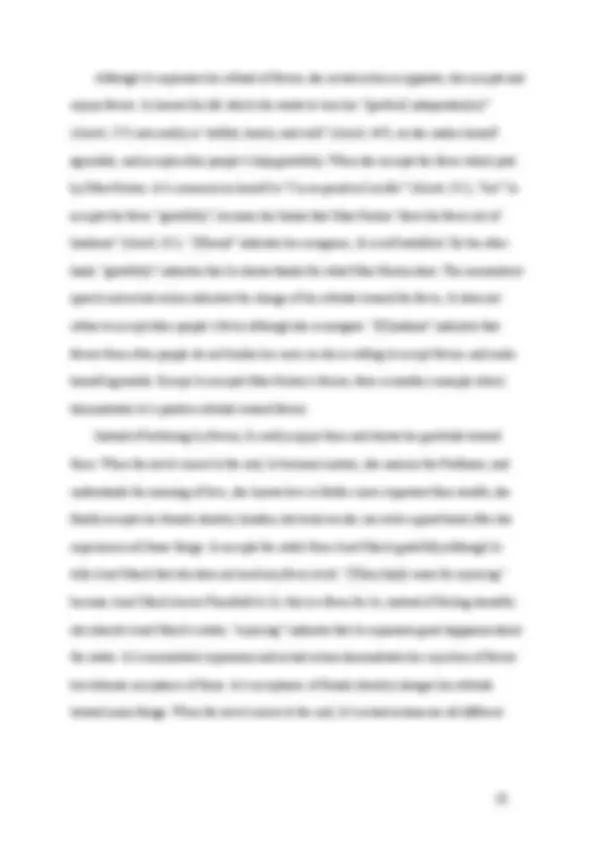
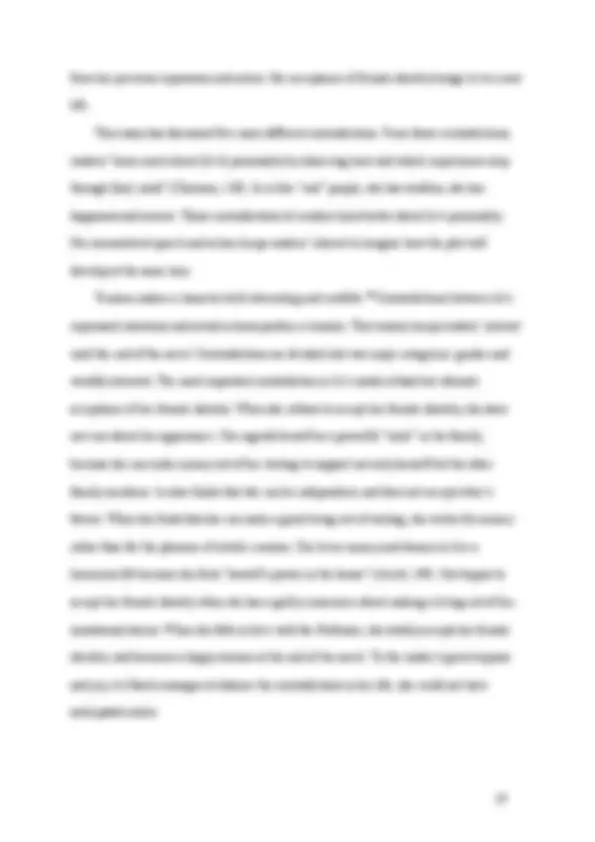
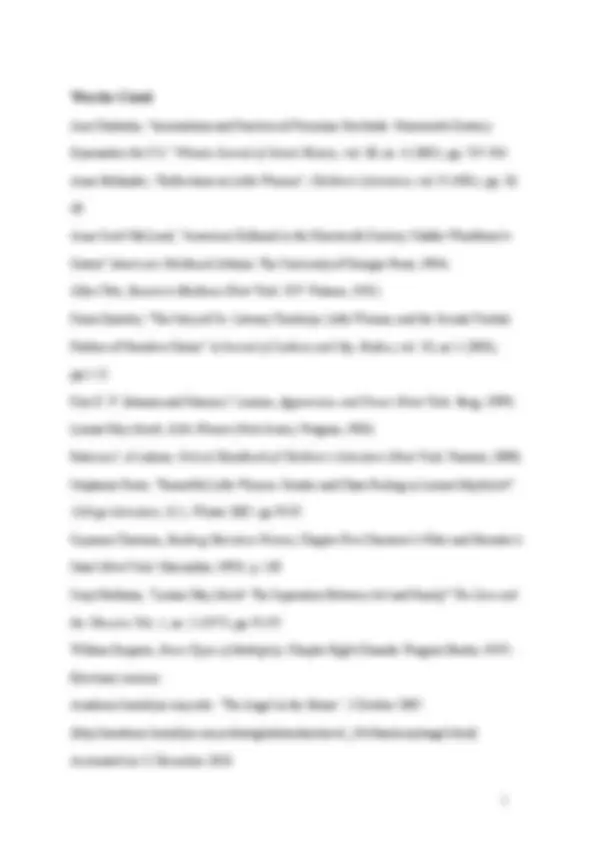



Study with the several resources on Docsity

Earn points by helping other students or get them with a premium plan


Prepare for your exams
Study with the several resources on Docsity

Earn points to download
Earn points by helping other students or get them with a premium plan
Community
Ask the community for help and clear up your study doubts
Discover the best universities in your country according to Docsity users
Free resources
Download our free guides on studying techniques, anxiety management strategies, and thesis advice from Docsity tutors
How the character Jo in Louisa May Alcott's novel 'Little Women' reflects the author's views on art, family, and marriage. Jo initially expresses a desire to stay single and focus on her career, but later embraces marriage and motherhood. She also learns the importance of appearance and pleasing others. The document also discusses Jo's financial aspirations and her evolving attitude towards writing.
Typology: Slides
1 / 22

This page cannot be seen from the preview
Don't miss anything!















Liu Yu EN Level III English, Fall 2010 School of Teacher Education Kristianstad University Jane Mattisson
The plot of Little Women is not particularly memorable because it deals with day-to-day routines in the lives of five women.i^ The character, Jo March, on the other hand, is highly memorable because of the contradictions between her expressed wishes and ideas and her actual actions. This essay argues that these contradictions create a tension that stimulates the reader’s interest. To demonstrate this, two categories will be investigated: gender and worldly interests. The main contradictions discussed here are Jo’s initial refusal but ultimate acceptance of her female identity; her initial rejection of but ultimate yearning for love and marriage; the financial gain versus the artistic value of writing; her love of money and expressed admiration for poverty; her rejection of favors but ultimate acceptance of these. Tension is here defined as “the conflict created by interplay of the constituent elements of a work of art” (Tate, 72). In addition, contradictions are generally regarded as signs of tension, i.e. “two elements, each of which defines the other and has logical connectives, are connected by the forces” (Empson, 235). In this essay, tension is discussed in terms of contradictions and their consequences. Previous research on Jo has focused on her character,ii^ it argues that she is un-ladylike. Biographical Criticsiii^ argue that Jo reflects Alcott’s attitude toward art and family. Besides, New Criticsiv^ have focused on how Jo confronts with her social inadequacies. For this essay, it focuses on the tension, which is produced by contradictions. With the aid of New Criticism, this essay demonstrates how contradictions between thought and actual action create tension in Little Women. Jo March is the first character to appear in the novel; she is also the protagonist. It is Jo’s characteristic that “most persuade[s] her fans that she, rather than any of her sisters, is the most compelling site of readerly identification” (Foote, 74). It is primarily Jo’s unladylike tendencies that distinguish her from her sisters: she is a tomboy, she likes boys’ games and
her behaviour. She promises to change her boyish manners by saying “do [her] duty here instead of wanting to be somewhere else” (Alcott, 10) when she receives her father’s letter before the Christmas Day in chapter two. She makes a promise to become a lady only due to the consideration of her “duty”. The noun “duty” indicates the reason of her change, that is, her obedience to her father. Despite her unwillingness, she finally keeps her promise. The two verbs “pins” and “laces” in the example above indicate that Jo dresses like a lady. Also, she no longer whistles, uses slang or lies on the rug. The noun “son” in the sentence quoted above, shows that her father believes that her previous behaviour is quite boyish, and even regards Jo as a boy; but now Jo has clearly become a lady, at least in the eyes of her father. Jo’s positive attitude toward married life also indicates a desire to come to term with her female identity. When Meg returns home after she spends a fortnight in the Moffats’, Meg has a conversation with her mother and Jo. In this episode, the only sentence Jo says is that “ ‘[t]hen we’ll be old maids’ stoutly” (Alcott, 92). Meg dresses to enjoy the benefits of married life, Meg is just afraid of having no chance to find a good husband. However, Jo only declares that she will not marry concisely; the adverb “stoutly” is an indication of the strength of Jo’s resolution. Jo even thinks that marriage is something belongs to another world “where she could not follow” (Alcott, 91). What Jo wants is to do something splendid (Alcott, 36), she wants to be a spinster. What Jo wants most at that time is to be a writer, to earn money to support herself and to be independent. However, Jo even begins to look forward to being a wife. Beth’s death promotes Jo’s longing for marriage. After Beth’s death, she feels desperately lonely. Jo observes and is envious of Meg’s happiness as a wife. She discovers that “how much improved her sister Meg [is], how well she could talk, how much she [knows] about good…how happy she [is] in husband and children, and how much they [are] all doing for each other” (Alcott, 397). The four “how”s indicate the extent of Jo’s envy. She expresses a similar feeling in relation to
Amy and Laurie, declaring “How very, very happy they must be” (Alcott, 400). The final chapter of the novel confirms that not only has Jo changed her opinion about marriage, she embrace it to the extent that she is described as “a very happy woman”, whose dreams have come true and whose “greatest wish [has been] so beautifully gratified” (Alcott, 444-447). Jo does not become an adornment (Alcott, 5) as she thinks at the beginning of the novel. Jo’s dream is finally turned into reality through her marriage: she is loved by people around her, becomes a wife; and has her own career, she writes “a good book” as she wishes long time ago, and helps the Professor managing the school and teaches and nurses her boys. Besides, when the Professor proposes to Jo, she is satisfied with the love the Professor gives her, moreover she thinks about the responsibility that she should take in the family. She says “for woman’s special mission is supposed to be drying tears and bearing burdens” (Alcott, 438). Here, Jo accepts her female identity by sharing responsibility; she is willing to shoulder the responsibility as a wife. “[D]rying tears” indicates that Jo wants to take care of her family. She says the sentence in the quotation above in a “resolute” (Alcott, 438) manner, “resolute” demonstrates that her decision on “giv[ing] up her own hopes, plans and desires, and cheerfully liv[ing] for others” (Alcott, 398) and being a good wife. “[S]pecial mission” emphasizes that she values the responsibility she will takes for family. In this episode, Jo does not mention one word about her previous ambition. She cares more about the devotion to and the family. Another aspect demonstrating Jo’s acceptance of her female identity is that she learns household skills. Jo expresses that she hates to do housework at the beginning of the novel by saying “I can’t get over my disappointment in not being a boy…and can only stay at home and knit” (Alcott, 5). Jo shows her negative attitude toward her domestic role that she must stay at home and learns the household skills. Jo recognizes that knitting is a work which belongs to the women’s world, “can” indicates that Jo recognizes that doing housework is the
of a female. The acquisition of those housework skills represents Jo has the quality as a female. The possession of household skills is one of the aspects that signals Jo’s acceptance of female identity. Concerning with having a feminine appearance will be discussed as the last example to verify her acceptance of female identity. Pursuing beauty is a female occupation. Because Jo recognizes the importance of appearance, she becomes caring about her beauty, and she makes effort on making herself looked more attractive. Jo’s contradictory attitude towards the importance of appearance will be showed by her initial saying that she is indifferent to appearance and her actual action that she makes effort on improving her appearance. Jo’s attitude toward appearance is mainly reflected by her attitude toward dress. The definition of dress will be introduced here in order to get a better understanding about what aspects of appearance will be discussed in the next part. “[A]ll the modifications made to the human body and supplements to the body. Using this definition, dress includes a long list of changes to the body which can be either permanent or temporary” (Johnson and Lennon, 1). According to the definition, the next part of this essay directly addresses many different aspects of dress including gloves, hair, clothes. Jo expresses that she does not care about her appearance in an explicit manner. When Meg and Jo attend a party in Mrs. Gardiner’s, Jo says “[t]hen I’ll go without [gloves]. I don’t care what people say!” (Alcott, 24). This sentence shows that she cares about neither her appearance, nor other people’s comments on it. The use of the exclamation mark reinforces Jo’s indifferent attitude toward appearance. However, what she does shows that Jo cares about appearance and she thinks that appearance is really an important thing, Jo actual does is completely different from what she says. Her positive attitude towards appearance is seen in her eagerness for a pair of neat gloves. When she sees the nice gloves Laurie is wearing, she “wish[es] she has two neat gloves” (Alcott, 29). Nonetheless, when Meg has a pair of near gloves, Jo says she can go without. Jo’s different reaction to the same situation indicates that
Jo “finds her sartorial model in the opposite sex and decides she can grow up to be a splendid woman with nearly laced boots and clean linen” (Elbert, 205). When Jo encounters with Laurie, she becomes caring about her appearance. Besides, Jo cares about her hair is an another important example to demonstrate that she realizes the importance of appearance. After they arrive at Mrs. Gardiner’s, Jo “give[s] her collar a twitch and her head a hasty brush” (Alcott, 26). Words “hasty” demonstrates Jo’s careless attitude toward her clothes and hair. Jo’s careless attitude toward her appearance testifies that she does not believe appearance is an important thing. Jo claims that she is “the man of the family” (Alcott, 6) and her careless way to treat her hair indicates that Jo’s lack of vanity about her hair and her appearance. However, when Jo prepares to attend the party, she has “nineteen hairpins…which [is] not exactly comfortable” (Alcott, 25). The noun “nineteen hairpins” indicates that she really wants to make her hair more tidy and attractive, and “exactly” shows that Jo feels uncomfortable when she wears so many hairpins but she wears them. This example shows that she is concerned about whether she looks elegant or not. She even says that “[L]et us be elegant or die!” (Alcott, 25), “elegant” is related to the appearance, and “die” is associated with one’s life. She regards her appearance as important as her life. The exclamation mark implies that Jo’s strong desire of pursuing the appearance. Jo’s concerning with her hair is exemplified when she “hope[s] no one would pass by till she [is] tidy again” (Alcott, 142). “[T]ill” underlines that she does not want to people to see her untidy, topsy-turvy and unladylike appearance. Furthermore, when she cuts her hair for money, she “assume[s] an indifferent air”, but she “bursts out” in bed for her hair at night (Alcott, 152). She is eager to do something to help her father, so she sacrifices her hair. “[B]urst out” means she feels sad about her hair because she likes her hair very much; Jo actually cares about her hair and beauty, although she pretends that she does not care about her hair.
her stories. All the description cited above analyze the contradiction between her initial refusal but ultimate acceptance of her female identity. As Jo’s acceptance of her female identity, her attitude toward love and marriage also changes. Her acceptance of her female identity enables her to recognize that she does need love and marriage. In the next part of this essay, Jo’s initial rejection of but ultimate yearning for love and marriage will be demonstrated by selected examples. Jo regards love as something “ridiculous” (Alcott, 141), and thinks romantic love is “horrid” (Alcott, 141). Those two adjectives in the quotation indicate Jo’s negative attitude to love. Jo expresses the same feeling when Jo’s overdeveloped imagination leads her to think that Beth falls in love with Laurie, she says “I’m the only one that has sense enough to keep out of mischief” (Alcott, 298). Instead of feeling happy and blessed, she thinks that Meg’s marriage and being a mother and Beth’s love affair are the source of trouble and difficulty. As Jo labels herself as rational girl, “sense” indicates that Jo believes that she keeps herself out of love and marriage is a sensible and practical decision. Just like Laurie’s comment on Jo that “[y]ou won’t show the soft side of your character” (Alcott, 230). Jo neither shows her love to anybody, nor wants anybody to love her. She thinks that she has no time to waste on such “nonsense” (Alcott, 230), she wants to be a writer, and earns money. For Jo, she thinks that love and marriage is a waste of time, so she never thinks about marriage. Jo is eager to be loved when Amy marries Laurie. “[T]he hungry longing for some one to ‘love with heart and soul’, and cling to while God let them be together” (Alcott, 401). She wants to love someone with her complete energy and enthusiasm, just as the narrator describes “love with heart and soul” (Alcott, 401). Jo’s prolonged unfulfilled desire for wanting to love someone is revealed by the phrase “longing for”, and her eager needing for love is emphasized by “hungry”. She wants to “cling to” someone, this indicates she wants to love, depend on and stay close to someone all the time. What is more, “while God let them”
indicates that nobody can stop her resolution to do so, except God. Her determination is revealed, she now dreams to fall in love with someone. Jo needs love and marriage to keep her out of loneliness. Beth’s death evokes Jo’s feeling of loneliness. Jo longs to be loved, so she says “…I am lonely… I might have said ‘Yes,’ not because I love him anymore, but because I care more to be loved than…(Alcott, 400)”. The italicized word “am” emphasizes the situation she now lives, that is, she “care[s] more” to be loved. She yearns the love, which Laurie gives her in the past time, so she is willing to accept Laurie’s proposal if Laurie would try again even if she knows clearly that Laurie’s love is not suitable for her. Moreover, Jo envies Amy’s love. “Truly, love does work miracles. How very, very happy they must be!” (Alcott, 400). She describes Amy’s happiness by using “must be”, which demonstrates that she is quite envious of Amy’s happiness, she believes that Amy’s happiness comes from Amy’s married life. Jo thirsts for love and marriage, she is in need of happiness, and she needs a companion. Contrasted with her previous attitude toward love, i.e. love is a ridiculous thing; her present attitude is completely different. Besides, Jo’s ultimate attitude towards marriage also differentiates from her initial claim. At first, Jo is disapproving of marriage. In the chapter “Secrets”, she cries that she does not want to grow up because she wants to keep her tomboy style, and does not wants to get married, to be a conventional and submissive woman. “Jo March knew very well what she mourned: the intact family of her childhood and the freedom to behave according to her nature rather than to a prescribed code for her sex” (MacLeod, 26). Jo does not want Meg to get married, she wants to keep the family intact. Jo believes that marriage will take her sister away, and break up her family. Jo joins in her sister’s wedding with “wistful eyes”, because Jo does not approve of Meg’s marriage, Jo believes that it is Meg’s marriage that leads to their departure.
“[T]oo well” leads readers to view her satisfaction of her spinsterhood. For her, spinsterhood means liberty, so Jo will never get married. She insists on believing that marriage is a restriction, “you’d hate my scribbling, and I couldn’t get on without it” (Alcott, 334). Jo thinks that marriage is an obstacle of her writing career, she can not go on writing when she gets married, however, being a writer is her favourite dream. Between career pursuit and marriage, Jo chooses her writer dream without thinking twice. Besides, the repetition of “any” in the quotation emphasizes Jo’s determination to pursue her liberty as equal as the refusal of marriage. To everyone’s surprise, Jo, who declares that she will never get married, marries the Professor so rapidly that “[a]lmost before she [knows] where she [is], Jo [finds] herself married and settle[s] at Plumfield” (Alcott, 441). “[F]ind herself married” means that she even does not intend and expect to marry. However, she feels unusual delight from her marriage; “…how happy she would be to walk through life beside him” (Alcott, 433), and she finally chooses marriage and live with someone forever instead of being an “old maid”, a “literary spinster, with a pen for a spouse” (Alcott, 402). Jo finally finds someone who makes her love him in spite of herself. Not only Jo marries the Professor, but also goes on her writing, “I may write a good book…I’m sure [married life] will be all the better for such experiences and illustrations as these” (Alcott, 447). At this time, Jo gets married, and continues to make her dream reality. She even believes that marriage can be helpful to her writing, what she ultimately actual action is combining her married life with her career pursuit at the same time. Jo finds a balance between her ambition and marriage because her wishes are perfectly gratified by her marriage. Except those contradiction discussed above, Jo also has contradictory attitude towards writing and wealth, which has a close relationship with her female identity and married life. Jo’s attitude towards writing and wealth is largely affected by her acceptance of female identity, love and marriage.
When Jo labels herself as the “man in the family” (Alcott, 6), she wants to earn enough money to support herself and family just like a man does. She begins “to feel herself a power in the house” (Alcott, 249) by writing. Jo uses her money to send Beth and her mother to the seaside, and Jo even says that “[t]hat’s what I tried for, and that’s why I succeeded” (Alcott, 249). She dreams of being a writer just because she makes up her mind to earn money, so she claims that “I think I shall write books, and get rich and famous” (Alcott, 133) and insists that writing book “suit” (Alcott, 133) her. The modal verb “shall” emphasizes her resolution to earn money by being a writer. Besides, “suit” indicates that she believes that she has the ability to make a good living out of writing; she has the confidence in herself because “I think” in the quotation above shows her decision is made on the basis of consideration. Being wealthy and famous are Jo’s aims when she starts her writing career. Jo ignores the quality of her writing for the sake of money. Jo’s money-oriented writing also can be illustrated when she attends the literary lesson, she comes across a boy who loves reading sensational stories, she “amuse[s] at his admiration of the trash” (Alcott, 247). The noun “trash” indicates that she thinks the quality of the story is poor, and looks down on such story. Furthermore, “amuse” emphasizes her disdain for those stories. In this scene, Jo’s negative attitude toward sensational stories is clearly verified. Nonetheless, when Jo hears that Mrs. Northbury earns a lot of money by writing sensational stories, she looks “more respectfully” (Alcott, 248) at the story. Her inconsistent attitude toward the same story emphasizes that she values money. Moreover, she builds up her own sensational story by the time the lecture ends (Alcott, 248). Her prompt reaction in this scene indicates her eagerness to make money by writing. Just as Jo says “cash is more convenient” (Alcott, 250) in the house she sets her goal on earning money. Beth’s death triggers Jo’s maturation, Jo’s ultimate action is in stark contrast to what she claims and behaves previously. Jo cares about artistic value of writing and no longer writes
in [your story]…humor and pathos make it alive…and [you] put your heart into it” (Alcott, 398). In Jo’s writing, “put your heart into” shows she is absorbed in her writing, full of enthusiasm. Jo’s attitudes toward writing, female identity and love and marriage have effects on her attitude toward wealth; the most obvious evidence is that she makes money by writing. Jo thinks that she is the man in the family, so she wants to make money to support family; when she finds that she has the ability to make money by writing, she resolves to write for money. When Jo ultimately accepts her female identity, she recognizes the importance and necessary of love and marriage, so she gets married. After she gets married, she understands that love is far more important than money; she even appreciates poverty, so she cares more about artistic value of her writing. In the next part of this essay, Jo’s contradictory attitude toward wealth will be demonstrated. When the four sisters and Laurie talk about their castles in the air, Jo expresses that she wishes to have “a stable full of Arabian steeds” (Alcott, 133). “Arabian [steed]” shows that she dreams to live a luxurious life, only rich people are able to afford horses. “[F]ull” emphasizes her great ambition, that is, being a wealthy person who can afford lots of horses. Besides, she hopes to have “rooms piled with books” (Alcott, 133), this sentence re- emphasizes her dream of being a wealthy person. When Jo is young, she dreams of being wealthy just because she likes horses and books. When she goes to New York, she still yearns for a wealthy life, but she wants to use the money to do something for other people at the time, such as she wants Beth to have a better life. She dreams of going abroad someday, and having money to do charity work, those dreams “[have] been for years Jo’s most cherished castle in the air” (Alcott, 317). This sentence quoted above reveals that Jo has the ambition of living a luxurious life; and “for years” emphasizes her resolution of being a rich person.
Jo’s eagerness for money leads Jo to give up her own opinion on writing for the sake of money. When one publisher asks her to delete the moral part in her story, she opposes the publisher by saying “[b]ut, sir, I [think]…” (Alcott, 319). This sentence indicates her insistence on adding the “morals plots” (Alcott, 319) in the story. However, when the publisher refuses her proposal, she just asks “[w]hat do you—that is, what compensation—” (Alcott, 319). The incoherent speech demonstrates that she drops her own opinion on writing for money; by using the dash the narrator emphasizes her hesitation and nervousness of dropping her own opinion for money. Finally, she chooses to “[hand] back the story with a satisfied air” (Alcott, 319). Jo gives up her insistence that stories should have some educational meaning. She agrees to cut the moral parts in her story in order to catering to the publisher. Furthermore, she even “wish[es] [she has not] any conscience, it so inconvenient” (Alcott, 327). “[H]as not” and “any” both show that she does not want to have conscience, “so” emphasizes her negative attitude toward conscience, because she thinks that conscience is the obstacle to earning money. “[W]ish” highlights her desire to drop her integrity for money, she knows that it is important for a story to have some moral parts, but she does not insist on her opinion. However, Jo’s ultimate action is in stark contrast to her previous action. After Jo realizes the fact that her sensational stories will hurt readers and herself, she writes no more, refusing to sacrifice her conscience for money again. When “one person offer[s] enough [money] to” buy her child’s story if she can adjust her story to meet the publisher’s requirement, she refuses to do so (Alcott, 327-328). The narrator describes that Jo refuses to change her story “in a fit of very wholesome humility” (Alcott, 328). Jo even feels delighted when she realizes that she earns no money by the time the winter passed. She recalls “with the happy thought” that “[she has] written no books, earned no fortune” (Alcott, 329). Jo’s attitude changes now. “[H]appy” indicates that she gains satisfaction from the fact that she earns no money; at this
Although Jo expresses her refusal of favors, she actual action is opposite, she accepts and enjoys favors. Jo knows the life which she wants to turn her “[perfect] independen[ce]” (Alcott, 275) into reality is “selfish, lonely, and cold” (Alcott, 447), so she makes herself agreeable, and accepts other people’s help gratefully. When she accepts the favor which puts by Miss Norton. Jo’s comment on herself is “I’m as proud as Lucifer” (Alcott, 311), “but” Jo accepts the favor “gratefully”, because she thinks that Miss Norton “does the favor out of kindness” (Alcott, 311). “[P]roud” indicates her arrogance, Jo is self-satisfied. On the other hand, “gratefully” indicates that Jo shows thanks for what Miss Norton does. The inconsistent speech and actual action indicates the change of her attitude toward the favor, Jo does not refuse to accept other people’s favor although she is arrogant. “[K]indness” indicates that favors from other people do not burden her now, so she is willing to accept favors, and make herself agreeable. Except Jo accepts Miss Norton’s favors, there is another example which demonstrates Jo’s positive attitude toward favors. Instead of bothering by favors, Jo really enjoys them and shows her gratitude toward them. When the novel comes to the end, Jo becomes mature, she marries the Professor, and understands the meaning of love, she knows love is farther more important than wealth, she finally accepts her female identity, besides, she believes she can write a good book after she experiences all those things. Jo accepts the estate from Aunt March gratefully although Jo tells Aunt March that she does not need any favor at all. “[T]hey ha[s] cause for rejoicing” because Aunt March leaves Plumfield to Jo, this is a favor for Jo, instead of feeling stressful, she inherits Aunt March’s estate, “rejoicing” indicates that Jo expresses great happiness about the estate. Jo’s inconsistent expression and actual action demonstrates her rejection of favors but ultimate acceptance of these. Jo’s acceptance of female identity changes her attitude toward many things. When the novel comes to the end, Jo’s actual actions are all different
from her previous expression and action. Her acceptance of female identity brings Jo to a new life. This essay has discussed five main different contradictions. From those contradictions, readers “learn much about [Jo’s] personality by observing how and which experiences seep through [her] mind” (Chatman, 130). Jo is like “real” people, she has troubles, she has happiness and sorrow. Those contradictions let readers know better about Jo’s personality. Her inconsistent speech and action keeps readers’ interest to imagine how the plot will develop at the same time. Tension makes a character both interesting and credible.vii^ Contradictions between Jo’s expressed intentions and actual actions produce a tension. This tension keeps readers’ interest until the end of the novel. Contradictions are divided into two major categories: gender and worldly interests. The most important contradiction is Jo’s initial refusal but ultimate acceptance of her female identity. When she refuses to accept her female identity, she does not care about her appearance. She regards herself as a powerful “male” in the family, because she can make money out of her writing to support not only herself but the other family members. Jo also thinks that she can be independent, and does not accept other’s favors. When she finds that she can make a good living out of writing, she writes for money rather than for the pleasure of artistic creation. She loves money and dreams to live a luxurious life because she feels “herself a power in the house” (Alcott, 249). She begins to accept her female identity when she has a guilty conscience about making a living out of her sensational stories. When she falls in love with the Professor, she totally accepts her female identity, and becomes a happy woman at the end of the novel. To the reader’s great surprise and joy, Jo March manages to balance the contradictions in her life, she could not have anticipated earlier.